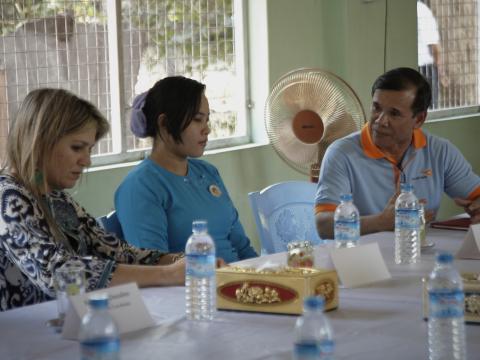Netherlands Queen Máxima visits World Vision Myanmar microfinance Programme in Hmawbi

March 31st 2015 is an auspicious day for World Vision Myanmar particularly the microfinance program in Hmawbi Township, Yangon.
The visit of Her Majesty Queen Máxima made the moment special for both World Vision Myanmar and the community members in Hmawbi.
Several days before the Queen’s visit, the community, local authorities and World Vision staff were busy preparing to host Her Majesty the Queen.
Prior to the visit, in her capacity as the UN’s Global Ambassador for Financial Inclusion, Her Majesty hosted roundtable discussions with microfinance, banking, telecom, and funding representatives. After delivering a speech at the Yangon University convocation hall, Her Majesty Queen Máxima proceeded to Myaungdagar village in Hmawbi to gain firsthand experience into Myanmar microfinance at a field level. Her Majesty was accompanied by the Ambassador Mr. Joan Boer, UN Resident Coordinator and officials from UNDP and UNCDF.
Her Majesty was hosted by World Vision Myanmar, the Myanmar Maternal and Child Welfare Association (MMCWA), and the Myanmar Women Affairs Federation (MWAF) in Hmawbi Township.
Mr. Neal Youngquist, General Manager of WVM Microfinance programme also welcomed The Queen and introduced microfinance Branch Managers and clients representing World Vision and the newly started microfinance provider, BRAC. Mr. Youngquist sa
id in his welcoming remarks that the social impact of microfinance would be a focus of discussions.
Her Majesty interjected that the ability of microfinance to realize benefits at a household level is an area “near and dear to her heart.”
Presenting the opening remarks was Daw Ingyin Khin Zaw, Chairperson of MMCWA and MWAF of Hmawbi Township, followed by remarks by Dr. Ivan, WVM Operations Director.
“The role of government and NGOs are important in assisting families with the challenges such as proper nutrition, healthcare, schooling, clothing, and sanitation, but this role is for a limited time and scope. Most of all households and women need to develop sustainable long term solutions toward a better life for themselves and those they care for – especially children,” Daw Ingyin Zaw said in her opening remarks.
The Queen enquired about the interest rate, the saving practices and the training provided for clients. She also asked about the impact of the programme for the children of clients in terms of health and education. The WVM clients responded with details from their experiences in borrowing funds in a formal manner and the resulting benefits within their households.
Escorted by World Vision’s microfinance Operations Manager, Thurein Htoo led Queen Máxima to Myaungdagar Market, where she met three female clients whose business is selling snacks, eggs, vegetables, and plastic furniture. She was able to learn how World Vision’s loans have transformed the lives of each of the clients and their families. Prior to receiving a World Vision business loan each of these clients were borrowing from informal sources at extremely high lending rates exceeding 100% per year.
During the following day of Her Majesty’s visit, she met with President Thein Sein, as well as leaders from the Central Bank and Financial Regulatory Department responsible for microfinance supervision.
The Queen was very pleased to meet personally with clients at their business locations and to hear of the impact formal microfinance services continues to have within their households.
See a short video of her visit.
World Vision Myanmar Microfinance in Hmawbi
Hmawbi is a nearby township to Myanmar’s commercial capital of Yangon. It is known as a supply of vegetables, fruit, flowers, poultry, eggs, etc for the Yangon urban market. Over the years its population of almost 250,000 has grown from migrants moving from rural areas in Myanmar’s Central Dry Zone and Ayeyarwady Division. Despite this steady growth, there has not been a commensurate rise in financial services to meet the need and demand of micro to small businesses and farmers.
Livelihood activities were severely constrained from a lack of access to finance, formal or informal. Recognising this need, World Vision began in early 2012, microfinance services in Hmawbi with a small but meaningful outreach, From this small start, World Vision is now providing credit services to 2600 households with an loan portfolio exceeding $450,000.